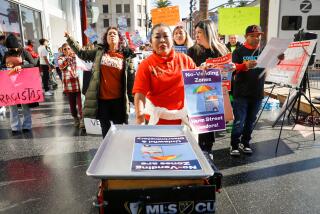Law on News Racks to Be Enforced Again After Court Victory
- Share via
After a courtroom victory last week, the city of Glendale will resume enforcement of a 1975 news rack ordinance that was challenged by a distributor of sexually oriented publications, Assistant City Atty. Scott Howard said.
The constitutionality of the ordinance, which restricts the number of news racks on streets, was upheld by a judge last week.
Paul Duffy and his wife, Eunice, filed a lawsuit against the ordinance in January, 1986. The couple owns San Fernando-based Kimbo Distributors, which sells such sexually explicit newspapers as the Los Angeles Free Press and Impulse.
In a six-page ruling issued March 30, Glendale Superior Court Judge Joseph Kalin said the ordinance “does not attempt to regulate or restrict the content” of publications.
A year ago, Glendale suspended enforcement of the ordinance until the lawsuit was resolved. The ordinance will be enforced mainly on a “complaint basis,” as it was before the lawsuit, Howard said. Violators can be fined $200 and have their news racks confiscated.
The ordinance limits to eight the number of news racks in any given location and allows no more than 16 racks on one side of a city block.
In determining which publications will be allowed at a particular location, the ordinance gives priority to general-circulation newspapers--those that devote at least 25% of their space to local or wire service news and are published five or more times a week. Second priority is given to newspapers that publish two to four times a week. Third priority goes to papers published once a week.
Many of the Duffys’ papers are published once a week or once every two weeks.
The Duffys filed suit after the city tagged some of their news racks and ordered them to move others.
The city also has tagged news racks containing publications that were not sexually oriented.
Howard said he did not know how many of the Duffys’ news racks are in violation of the ordinance. However, Donald W. Cook, attorney for the couple, said about a dozen racks in eight locations are in violation of the ordinance.
During a non-jury trial before Kalin in December, Cook argued that the ordinance is unconstitutional because it restricts news racks based on content of newspapers.
After reading Kalin’s decision, Cook said he disagreed with the ruling.
“The court’s contention is that the selection process is content-neutral,” Cook said. “It is not content-neutral. It relies on a government code scheme which expressly utilizes the content of the newspapers.”
Appeal Uncertain
Cook said he is uncertain whether the Duffys will appeal the decision.
In his decision, Kalin wrote:
“The city can control the number, size, construction, placement and appearance of vending devices in order to achieve its goal without unduly restricting the free dispersal of information.
“Plantiffs have . . . failed to carry their burden of establishing the ordinance resulted or will result in an unreasonable restriction upon its exercise of constitutional guarantees.”
Kalin also ruled that the Duffys failed during the trial to support their claim that moving their news racks from areas clustered with racks of more popular publications would destroy 75% of their business in Glendale.
Assistant City Atty. Howard said he was pleased with Kalin’s decision.
But Kalin agreed with the Duffys that Glendale does not provide sufficient notification before confiscating news racks.
The ordinance requires authorities to wait five days after tagging violating news racks before seizing them. The waiting period is meant to give the distributor time either to contest the tagging or to move the rack. The ordinance does not require mailing a notice informing the distributor of the violation.
“Tagging of the newspaper racks is insufficient in that it may fail to provide actual notice,” Kalin said.
Kalin suggested that the city amend the ordinance to allow a notification period of 10 days. The judge also recommended that notification be mailed to the distributor. However, he stopped short of ordering the city to adopt his suggestions.
In 1985, city officials tagged 18 of the Duffys’ Glendale street racks, Howard said. The racks were confiscated five days after they were tagged because the Duffys did not request a hearing in time, he said.
The Duffys’ racks were among 55 tagged citywide that year, Howard said.
After the city tagged 14 more of the Duffys’ news racks at eight locations in January, 1986, the couple filed the suit.
More to Read
Sign up for Essential California
The most important California stories and recommendations in your inbox every morning.
You may occasionally receive promotional content from the Los Angeles Times.













